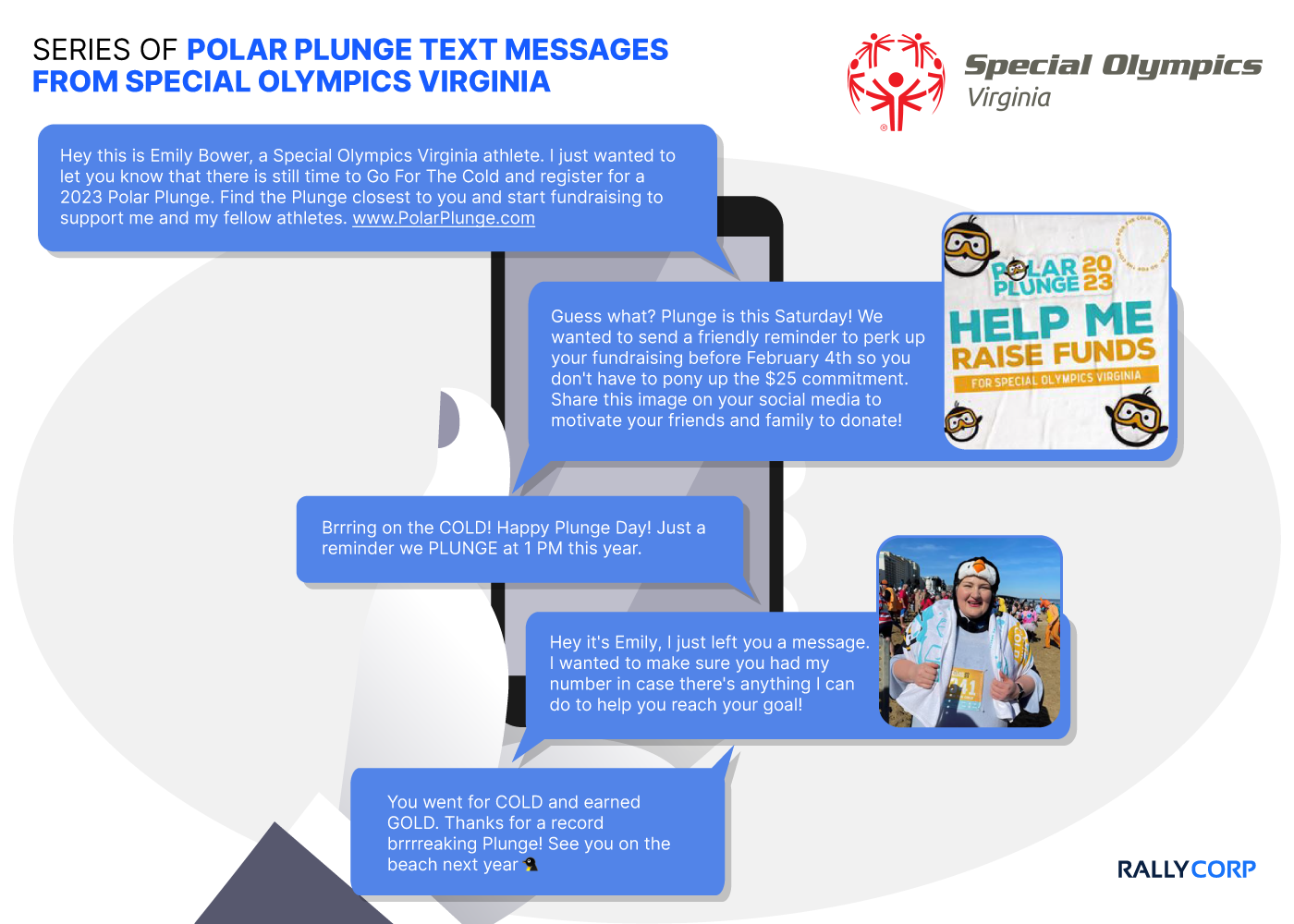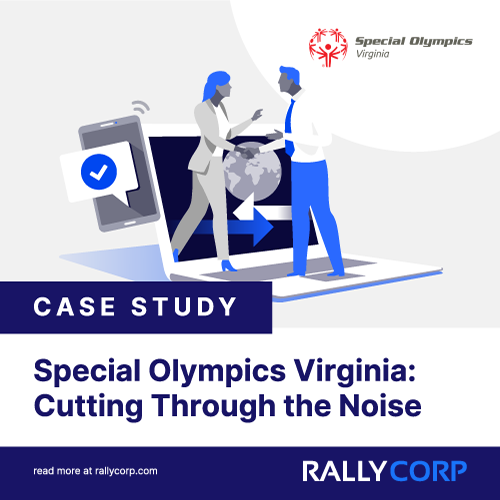Case Study: Special Olympics Virginia

We talked with two leaders from the Special Olympics Virginia—Director of Development Katelynn Howell and Director of Marketing Services Aliza Tekavec—about the pandemic impact, how to make texting work, and using Rally.
“There’s so much noise in the email world; we needed a way to cut through.” -Aliza Tekavec
What They Do: Sports organization for people with intellectual disabilities
Founded: Special Olympics was founded in 1968; Special Olympics Virginia was incorporated in 1975.
18,000+: Athletes served across Virginia
Learn more: SpecialOlympicsVA.org
About:
Special Olympics provides year-round sports training and athletic competition in a variety of Olympic-type sports for children and adults with intellectual disabilities. This gives them continuing opportunities to develop physical fitness, demonstrate courage, experience joy, and participate in a sharing of gifts, skills, and friendship with their families and other athletes.
But Special Olympics is about more than just sports. Through sports, they show others the capabilities of people with intellectual disabilities so they can be more included in society. When people interact with their athletes, they learn to start with what's possible, instead of what isn't.
“Sports is the vehicle to bring people together and change their expectations of what people with intellectual disabilities, our athletes, can do.” -Howell
Biggest challenge:
People often misunderstand what Special Olympics is about, assuming they only focus on kids or student athletes.
“We were at a basketball tournament this weekend and the athlete who lit the torch has been playing basketball for 35 years,” Howell said. “Athletes as young as 2 are involved in our preschool programming and there is no upper age limit—we welcome anyone, anytime!”
Pandemic Impact
- Pause and restart: The pandemic threw everybody for a loop, and Special Olympics Virginia is still working to get people back into the routine of sports, whether it’s athletes and their training or their inclusive school programs. They had a good rhythm going pre-pandemic, but had to put everything on pause and then begin to rebuild.
- Leveling out: The good news is things are returning to normal. For example, their 2023 Polar Plunge participation numbers nearly matched their pre-pandemic Plunge in 2020. “It was awesome,” Howell said. “We had probably a handful less than we did in 2020—but essentially it picked up right where we left off and then those involved went above and beyond in fundraising. Because of that, we had our most successful Plunge season in 31 years, which dates back to when we started, and all of our events exceeded budget goals. It was inspiring to see the excitement and energy of our supporters and fans after a few challenging years.”
- Losing volunteers: Post-COVID, recruiting volunteers has been a challenge. Some of it is the natural churn that happens—the contact for a company team leaves their job and Special Olympics Virginia has to forge a new connection. But they’ve also noticed long-time volunteers who paused volunteering during the pandemic have since reevaluated how they spend their time. Getting back into the swing of competition and events has helped, with last year serving as a reminder and drive for increased interest this year. “We are working on opportunities and outreach to reconnect but also build—so anyone interested in volunteering should reach out!” Howell added.
- Silver lining: “We did actually thrive in some areas,” Tekavec said. “It gave us an opportunity to focus on an objective we weren’t able to before.” Special Olympics Virginia launched virtual fitness training programs, helping athletes stay fit and focused during the pandemic. It is well documented that people with intellectual disabilities are less active than those without; this is not because of their disability, but the lack of access to opportunities that fit their needs. Special Olympics fills that gap through sports but is looking to focus more on ongoing fitness programming—beyond the once-a-week-practice traditional format of the program—to truly move the needle in an athlete’s overall health.
“It forced us to think about things differently.” -Tekavec
Why did you choose Rally?
- Special Olympics Virginia started texting because they needed a way to cut through the noise. Their fundraising platform didn’t have the necessary tools, so they looked for something else. They started with another platform but soon realized they needed more tools. Rally offered video, ringless voicemail, and the ability to have a conversation.
- “Our biggest desire was to go from us just saying something to them to opening a line of communication,” Tekavec said.
- “People do respond to emails, but people are always on their phone. So what can we do to connect with them where they are?” Howell said.
Tips for texting:
- Start small: “We took baby steps,” Tekavec said, describing how Special Olympics Virginia got started with texting.
- Be strategic: “We haven’t been in the texting game that long,” Tekavec said, “But we’ve developed our strategic plan for communication very quickly and have tried to keep it fresh.”
- Experiment: “We have a very specific strategy for texting that we’ve developed over trial and error the past couple of years,” said Howell. “I think, honestly, probably last year and this year we’ve hit our stride and really nailed down our voice and the different groups we work with.”
- Know your audience: Special Olympics Virginia segments their audience as much as possible so they can reach specific people, whether it’s participants for a specific event, nearby college students, high-dollar donors, etc. They can also move people through a process from registering to fundraising to participating. “So what’s cool is that we can see them go through that process and move from bucket to bucket and the messaging changes,” Howell said. “Versus in the past if we had just one event list and we can only text that event list, we would have to be pretty broad with what we were saying.”
- Conversation: “As we went further into the texting communication world, we realized it was important to be able to talk back and forth and not just talk at them,” Tekavec said.
- Ask questions: “A big push for us this year was ending things with a question,” Howell said. That kind of approach can emphasize the need to take action.
- Don’t over do it: “We are very meticulous in making sure that someone’s not getting three texts in one day or even every day,” Tekavec said. “We really calendar it out and usually our emails coincide with our texts. So they may get an email and then the next day they may get a text, and then we leave them alone for days.”
Strategy in Action
Here’s a look at Special Olympics Virginia sending specific, targeted texts depending on where someone is at:

Human Communication
“Texting just comes with this feeling of more human communication, whereas emails can seem very robotic and faceless,” Tekavec said. “Even when we try to do them the same way, there’s something about text. When I send an email it doesn’t translate as well as a text from an athlete. There’s a voice there so it makes it not robotic or superficial.”
Ringless Voicemail
Special Olympics Virginia has taken advantage of the new ringless voicemail, which sends a voicemail like a text message. They’ve used it about three times and been successful.
“Not only does it make it that much more personal, but when we send the voicemails that say ‘This is Emily, our athlete,’ she’s actually talking to them and so they know we didn’t just make up an Emily.” -Tekavec
Have Fun
“Texting is usually a fun part of the day whenever it happens, because we can have a little bit more fun with it,” Howell said. “Whether it’s cold weather puns or silly responses. We find ourselves laughing when we are responding to texts. It’s a highlight.”
Download: Cutting Through the Noise
You can download this case study as a PDF to print and share:


About the Author

James Martin is founder of Rally Corp, helping nonprofits mobilize supporters with human-centered text messaging and mobile engagement. With 20+ years in marketing, he shares insights on the Your Rally Point Podcast and rallycorp.com.


